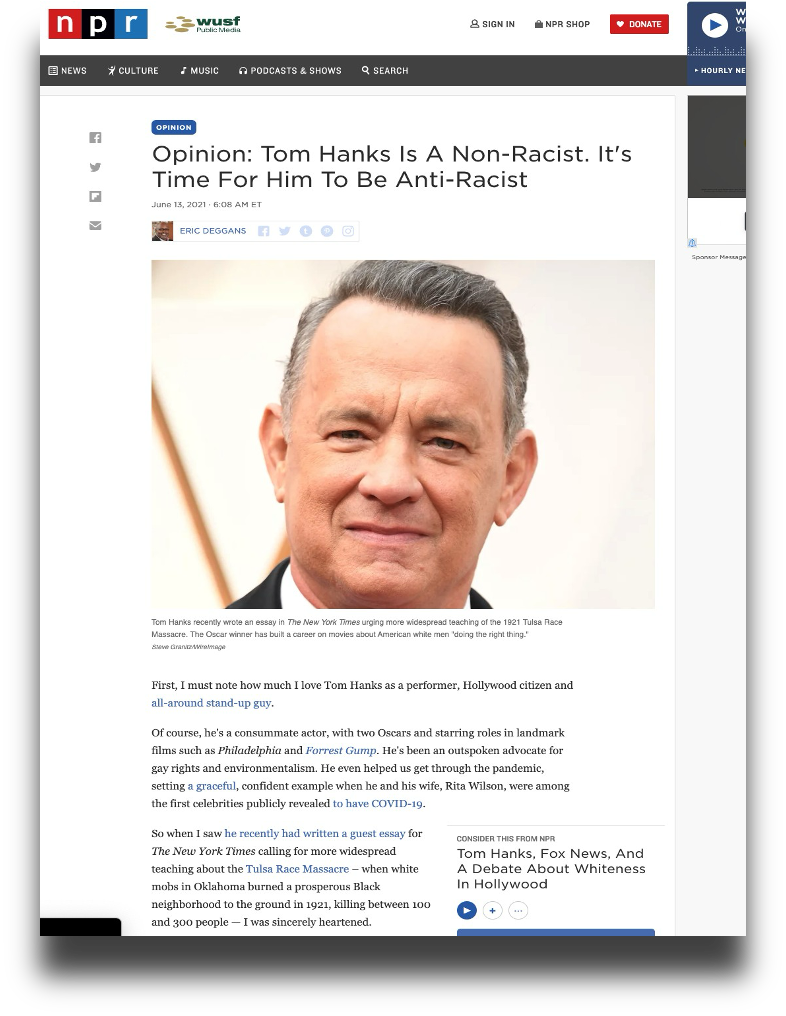It’s less about political distraction and more about invalidating journalists and academics while convincing us we can no longer talk over contentious subjects

I know it seems like the controversy over Sydney Sweeney’s American Eagle ads was a thousand years ago – in part, because Donald Trump ensures not a day goes by when there isn’t some fresh bit of nonsense attached to his name or his administration.
But now that the dust has settled a bit, it’s worth a little space here to note exactly why some ideologues really wanted to have this fight about the meaning of the tagline “Sydney Sweeney Has Great Jeans” and how it connects to something I experienced a few years ago.
And ultimately, how it all connects to the current fight journalists and academics are waging against ideologues determined to silence them.
First, the ad itself: Sweeney, the blonde, blue-eyed and gorgeous co-star of HBO’s Euphoria, who seems poised to blow up with a string of high-profile projects this fall and beyond, offered a titillating (and kinda obvious) pitch for American Eagle jeans last month. Her patter included this line: ““Genes are passed down from parents to offspring, often determining traits like hair color, personality and even eye color. My jeans are blue.”
I guess some people thought this might be a veiled reference to eugenics and the preference for blue-eyed, blonde, white people among some right-wing extremists, especially Nazis. Given the stepped-up assaults on diversity and inclusion by conservatives and the Trump administration, I can’t say I totally blame anyone for worrying about such messaging.
But I don’t really think that’s what happened here, outside the fever dreams of ideologues on both sides of the political spectrum.
Still, it was enough to gin up the outrage machine among conservatives, with President Trump eventually weighing in after he heard Sweeney registered to vote as a Republican before the 2024 presidential election. “Sydney Sweeney, a registered Republican, has the ‘HOTTEST’ ad out there,” Trump gushed on his social media platform Truth Social, in a predictable attaboy.
What struck me immediately: This is a fight that conservative ideologues WANT to have for many reasons beyond distracting the public with a manufactured controversy.
First, their goal is to assure their supporters that liberals are using unreasonable and unfair criticisms to take away things they love. If you’re a fan of Sydney Sweeney and friendly to conservative ideas, it likely sounds preposterous that a cheeky ad for pants could be presented as a hidden argument for Nazi ideals.
(Though I remain confused why the same logic doesn’t apply for some when considering Trump’s preposterous contention that he didn’t lose the 2020 election to Biden.)
This kind of argument also tries to throw cold water on the idea that any criticism about subtle messaging in media is unreasonably touchy – especially when leveraged against conservative targets.
It’s particularly aimed at showing conservatives as defenders of fun and good times, while liberals are derided as party poopers and Debbie Downers. I always felt conservative firebrands like Rush Limbaugh and Glenn Beck were most effective when they cast themselves as happy warriors – the guys having a good time with fat cigars and strong drinks, laughing at dour liberals too nitpicky to know a good time if it jumped them in a dark alley. When Limbaugh and Beck let their complaints turn toxic and bitter, it seemed a lot less fun to join their team.
Most perniciously, this argument over Sweeney is about advancing the idea that we all cannot negotiate these issues by talking to each other. The thinking goes: If liberals are so extreme that they think an irreverent ad for jeans is supporting Nazism, how can you talk to them about anything? (feels like a bit of projection from the crowd which thinks the Deep State is controlling so much in government, but okay.)
I know all this, because similar tactics have often been used against my own columns and punditry. Though ideologues often must distort what I actually have said to make it work.
This happened prominently about four years ago, when a column Tom Hanks wrote for the New York Times magazine inspired me to write a side commentary of my own.

I began my piece by admitting that I am a serious Tom Hanks fan, both as an admirer of his professional work and his public image as a principled, but accessibly nice guy.
His essay for the New York Times focused on how the educational system should do a better job teaching all students about hidden racial atrocities like the Tulsa Race Massacre. One line really struck me: “I think historically based fiction entertainment must portray the burden of racism in our nation for the sake of the art form’s claims to verisimilitude and authenticity.”
But as an entertainment critic, I knew Hanks executive produced and wrote a lot of scripted films, TV shows and documentaries that he doesn’t even appear in. Why didn’t he just commit to doing something like that himself in his piece?
In other words, why not move from being generically non-racist to being specifically anti-racist – taking action overtly in an area where he has influence to right an injustice?

Unfortunately, when Fox News and some other conservative ideologues got hold of the column, they transformed it into the notion that NPR was trying to cancel Tom Hanks.
Not sure how a column asking a guy to make MORE movies and TV shows equals trying to cancel him. It seemed as if some pundits who criticized my column hadn’t actually read it closely enough.
But it was easy for a Fox News pundit to distort what I had written to produce a diatribe criticizing NPR — and me — for daring to suggest there was a deeper message which could have come out of Hanks’ epiphany about the Tulsa Race Massacre.
And that’s another goal of these ginned up controversies: To stifle discussion in a flood of overheated rhetoric to keep people from finding common ground.
In more than a decade of speaking out on issues involving race and media, I know it is possible to find understanding through respectful debate and honest dialogue. That is what we are missing most in these times when people are so busy trading barbed lines on cable TV panel segments — any sense that we CAN actually talk to each other about contentious subjects in ways which produce real understanding.
In the past, traditional journalists and academics were often custodians of such debates. We were trusted to ground conversations in true facts and help verify whether ideas which sound probable might actually be possible.
So, when I think about the Sydney Sweeney discourse, I don’t think about political distraction, veiled media messages or the attempt to co-opt a pretty celebrity’s popularity for a political message.
I think of yet another blow against the notion of reasoned debate over contentious subjects. And the damage done to America when our most prominent public discussions are mostly empty, ideology-fueled exercises in rhetorical combat.